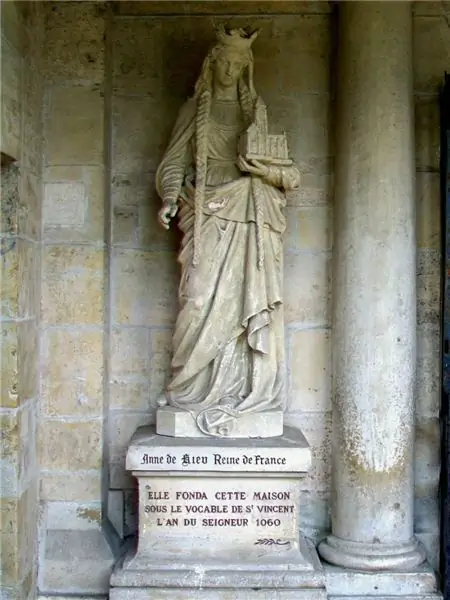- Author Matthew Elmers elmers@military-review.com.
- Public 2023-12-16 21:49.
- Last modified 2025-01-24 09:17.
Prince Yaroslav was nicknamed the Wise largely because he was an outstanding diplomat. He knew how to build bridges between Russia and other states. There was no more reliable means for this than dynastic marriages. Anna was his youngest daughter. She was born when Yaroslav had already become a grand duke, a powerful ruler.

Yaroslav's daughters received a good upbringing. The prince patronized the sciences and arts, developed schools. His daughters also studied. Anna could read and write, knew Greek and Latin. The French historian writes that King Henry I of France "got the fame of the charms of the princess, namely Anna, daughter of George, King of Russia, and he was fascinated by the story of her perfections." The golden-haired Anna was famous for her beauty and knew how to heal.
Yaroslav wanted to marry her off to the German king. However, the French took the initiative. An embassy from Paris, headed by Bishop Roger, arrived in distant Kiev. They brought battle swords, overseas cloth, precious silver bowls as a gift to the Russian prince. For the first time, Yaroslav refused the French. He counted on Germany's help in the war with Byzantium and wanted to consolidate the military alliance with the marriage. But the German emperor Henry III did not plan to link his fate with the Russian princess. It was then that the second embassy from France arrived in Kiev. And Yaroslav agreed.
The Russian prince was not going to yield to the French along with the daughter of "half a kingdom". Although he collected a rich dowry for Anna. Gold, precious stones, brocade …
The arrival of Anna Yaroslavna to the land of France was arranged solemnly. Obese, already middle-aged King Henry I went to meet his bride in the city of Reims, sacred to the French. Anna quickly mastered French. She was superior to her husband in education. On the marriage contract, Anna wrote her name, and the king put a cross instead of a signature. In Reims, according to tradition, Anna was crowned. She refused to swear an oath on the Latin Bible, took an oath on the Gospel, which she brought with her.
Paris seemed to her a gloomy and cramped city. There was not enough Kiev expanse. Among the courtiers, harsh morals prevailed, few could read and write. It was not accepted to wash. Legends have survived that Anna taught the French court to read, introduced Parisians to the bathhouse and made them use cutlery while eating. She inherited wisdom from her father. Even the pope sought her favor. “The rumor about your virtues, adorable virgin, has reached our ears, and with great joy we hear that you are performing your royal duties in this very Christian state with commendable zeal and wonderful mind,” the head of the Vatican throne wrote to Anna.

She bore Henry several children, and most importantly - the heir, the eldest son of Philip. Before Anna, this Byzantine name was not common in Europe.
Anna Yaroslavna was widowed at about 28 years old.
After the death of Henry, Anne shared with the regent Baudouin of Flanders the tutelage of Philip I. At that time, she takes an especially active part in public affairs. Baudouin soon died, and Anna ruled alone for several years. Anna introduced many useful innovations into French life. But most importantly, she kept the throne for her son. But there are enough contenders for power in any state …
Then Anna, against the will of her son-king, married Count Raoul de Crepy. The count was a relative of the late king and was one of the most influential nobles in France. From now on, the Church considered him a bigamist: he accused his previous wife of infidelity, fell in love with Anna, but did not dissolve the marriage according to all the rules.
Count Raoul was excommunicated, Anna was expelled from Paris. Her son Philip turned out to be a capable politician, the French have long remembered him with a kind word. He expanded the boundaries of the kingdom, enriched the treasury. The time will come - and he will be excommunicated for remarriage …

After the death of her second husband, Anna returned to government affairs. The son listened to her. And in old age, Anna devoted herself to serving God.
Anne founded the Convent of Saint-Vincent in Senlis, believed to atone for the sin of unlawful marriage. King Philip I granted this monastery privileges. Many years later, a statue of the queen was installed in the portico of the monastery church, holding in her hands a model of the temple she had founded. This is the daughter of the Kiev prince, Anna Yaroslavna, Queen of France.






